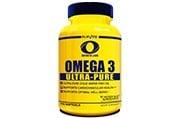

ELEVATE SERIES OMEGA 369
Table of Contents
ABOUT:
Scientifically developed in partnership, Infinite Labs® and Heuer M.D. Research, proudly introduce the Elevate Series—the newest edition of premium supplements that utilize clinically accredited ingredients backed by years of scientific research and systematic findings.
Omega 3•6•9 Fatty Acids for Cardiovascular
Health & Optimal Well-Being*
The Elevate Series was developed by one of the premier research medical doctors in the country. Dr. Marvin A. Heuer, M.D. F.A.A.F.P., has practiced medicine for over 30 years with experience in international and domestic clinical research, as well as pharmaceutical and nutraceutical development. With over 300 domestic and international nutraceutical patents and patents-pending, Dr. Heuer has served as Worldwide R&D Director and Vice President for a number of companies in the health industry before partnering with Infinite Labs on the design, formulation and development of the Elevate Series.
Elevate Series™ Omega 3•6•9
– Supports Cardiovascular Health*
– Supports Joint, Brain and Skin Health*
– Supports Optimal Well-Being*
– GMO & Preservative Free
Omega 3•6•9 at a Glance
Containing Flaxseed and Borage Seed Oils Flaxseed is a rich source of minerals, omega 3 fatty acids, phytoestrogens and soluble and insoluble fiber; abundant evidence supports the value of flaxseed in preventing health issues caused by chronic inflammation. One study reported that flaxseed supplementation lowered total cholesterol by 7% and decreased dangerous low-density lipoprotein (LDL) by 10%. These findings led the authors to conclude that regular flaxseed consumption may offer cardiovascular protection by modulating blood lipid levels.*
Flaxseed is a rich source of minerals, omega 3 fatty acids, phytoestrogens and soluble and insoluble fiber; abundant evidence supports the value of flaxseed in preventing health issues caused by chronic inflammation. One study reported that flaxseed supplementation lowered total cholesterol by 7% and decreased dangerous low-density lipoprotein (LDL) by 10%. These findings led the authors to conclude that regular flaxseed consumption may offer cardiovascular protection by modulating blood lipid levels.*
Another study compared the effect of flaxseed with cholesterol-lowering statin therapy in people with a high total cholesterol level (more than 240 mg/dL). Researchers divided subjects into three groups: a low-fat diet plus either a statin drug or 20 grams (about three tablespoons) of flaxseed daily for two months, while a third control group received the low-fat diet only. Supplementation with flaxseed reduced blood lipids: total cholesterol levels fell by 17%, LDL levels dropped by 4%, and triglycerides plummeted by 36%. These improvements in total cholesterol and LDL levels in the flaxseed group were comparable to those seen in the statin group.*
Borage oil contains GLA or Gamma Linolenic Acid, which is an omega 6 fatty acid. GLA is an essential fatty acid that our body is not able to synthesize itself. GLA deficiency increases inflammatory factors called cytokines in our bodies towards increasing inflammation, and with it increasing risk for chronic disease. GLA supplementation can support this deficiency, providing an anti-inflammatory effect to control and even prevent health issues. In a previous study, 37 patients with rheumatoid arthritis were randomly assigned to receive either 1.4g/day γ-linolenic acid in borage seed oil or placebo for 24 weeks. Patients who received borage seed oil showed significant improvement in tender joints count, tender joint score, swollen joint count, swollen joint score and pain compared with patients who received placebo. In the second trial, 56 patients with rheumatoid arthritis on stable therapy were randomly assigned to borage seed oil 2.8 g/day or placebo for 6 months. Patients who received borage seed oil had significant improvement in tender joints count, tender joint score, swollen joint count, swollen joint score and pain compared with patients who received placebo.*
Omega 3, found primarily in fatty fish with high oil content, consists of both Eicosapentaenoic Acid (EPA) and Docosahexaenoic Acid (DHA). Research has shown increasing evidence for anti-inflammatory, antithrombotic, antiarrhythmic and antiatherogenic effects of omega 3.
Higher fish intake is associated with decreased incidences of coronary artery disease and cardiovascular mortality in several prospective cohort studies1-8. Fish that are especially rich in the beneficial oils known as omega 3 fatty acids include mackerel, tuna, salmon, sturgeon, mullet, bluefish, anchovy, sardines, herring, trout, and menhaden. They provide about 1 gram of omega 3 fatty acids in approximately 3.5 ounces of fish9.*
Omega 6, also known as polyunsaturated fatty acids (PUFAs), are considered essential for health similar to that of omega 3 fatty acids. Along with omega 3 fatty acids, omega 6 fatty acids play a crucial role in brain function, as well as normal growth and development. They support skin and hair growth, maintain bone health, regulate metabolism and maintain the reproductive system. For general health, there should be a balance between omega 6 and omega 3 fatty acids. The ratio should be in the range of 2:1 – 4:1, omega 6 to omega 3, and some health educators advocate even lower ratios. Based on these studies, in 2009 the American Heart Association recommended human diets to include high levels of n-6 PUFAs that comprise at least 5%–10% of the energy intake10. Consistent with the health claim, a 2003 meta-analysis supported the finding that substitution of saturated fatty acids with vegetable oils rich in polyunsaturated fatty acids, including linoleic acid, lowered serum total and LDL cholesterol levels11.*
Omega 9 fatty acids are from a family of monounsaturated fats that are also beneficial when obtained in food. Omega 9 fatty acids have shown to be protective against cardiovascular risk factors. Because omega 9 fatty acids have been shown to increase HDL (“good”) cholesterol and decrease LDL (“bad”) cholesterol, they may help eliminate plaque buildup in the arteries. A review paper published in the Journal of Lipids assessed the current body of epidemiological and human clinical research and substantiated the cardio-protective value of omega 9 fatty acids. According to the review findings, increasing the consumption of omega 9 fatty acids, specifically as a substitute for saturated fat, can provide beneficial health implications for overall health12.*
References1. Li D. Omega-3 polyunsaturated fatty acids and non-communicable diseases: meta-analysis based systematic review. Asia Pac J Clin Nutr. 2015;24(1):10-5.
2: Yanai H, Katsuyama H, Hamasaki H, Abe S, Tada N, Sako A. Effects of Dietary Fat Intake on HDL Metabolism. J Clin Med Res. 2015 Mar;7(3):145-9. doi: 10.14740/jocmr2030w. Epub 2014 Dec 29. Review.
3: Wang X, Chan CB. n-3 polyunsaturated fatty acids and insulin secretion. J Endocrinol. 2015 Mar;224(3):R97-106. doi: 10.1530/JOE-14-0581. Epub 2014 Dec 8. Review.
4. Kromhout D, Bosschieter EB, de Lezenne CC. The inverse relation between fish consumption and 20-year mortality from coronary heart disease. N Engl J Med 1985; 312: 1205–9.
5. Daviglus ML, Stamler J, Orencia AJ, et al. Fish consumption and the 30-year risk of fatal myocardial infarction. N Engl J Med 1997; 336: 1046–53.
6. Hu FB, Bronner L, Willett WC, et al. Fish and omega-3 fatty acid intake and risk of coronary heart disease in women. JAMA 2002; 287: 1815–21.
7. Albert CM, Hennekens CH, O’Donnell CJ, et al. Fish consumption and risk of sudden cardiac death. JAMA 1998; 279: 23–8.
8. Albert CM, Campos H, Stampfer MJ, et al. Blood levels of long-chain n-3 fatty acids and the risk of sudden death. N Engl J Med 2002; 346: 1113–8.
9. Oh R. Practical applications of fish oil (Omega-3 fatty acids) in primary care. J Am Board Fam Pract. 2005 Jan-Feb;18(1):28-36. Review.
10. Harris W.S., Mozaffarian D., Rimm E., Kris-Etherton P., Rudel L.L., Appel L.J., Engler M.M., Engler M.B., Sacks F. Omega-6 fatty acids and risk for cardiovascular disease: A science advisory from the American Heart Association Nutrition Subcommittee of the Council on Nutrition, Physical Activity, and Metabolism; Council on Cardiovascular Nursing; and Council on Epidemiology and Prevention. Circulation. 2009;119:902–907.
11. Mensink RP, Zock PL, Kester AD, et al. Effects of dietary fatty acids and carbohydrates on the ratio of serum total to HDL cholesterol and on serum lipids and apolipoproteins: a meta-analysis of 60 controlled trials. Am J Clin Nutr 2003;77:1146–55.
12. Gillingham LG, Harris-Janz S, Jones PJ. Dietary monounsaturated fatty acids are protective against metabolic syndrome and cardiovascular disease risk factors. Lipids. 2011; 46(3):209-228.

















